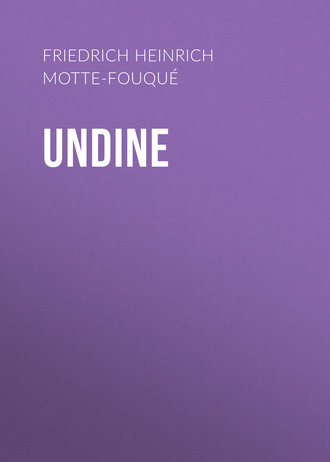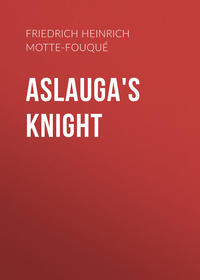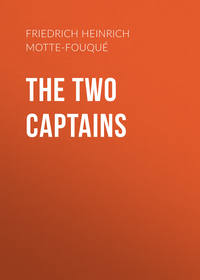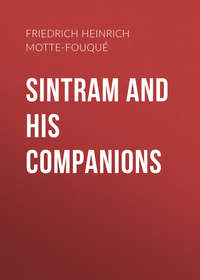 полная версия
полная версияUndine
One beautiful evening Huldbrand with his wife and Bertalda walked along the banks of the river Danube. The knight, who had ofttimes sailed down the river, told them tales of the wonderful countries through which it flowed, and of the beautiful town of Vienna, which rose so proudly on its banks.
'Ah!' said Bertalda, 'how I wish we might sail to this city of which you tell.'
And Undine, ever anxious to give pleasure to her friend, said, 'Yes, let us visit Vienna while the spring is still fair.' Huldbrand also was pleased at the thought of the journey, only once he bent toward Undine and whispered, 'Kühleborn, will we not be in his power if we sail down the river?'
His beautiful wife only laughed. She was too happy now to fear her uncle's power.
They therefore got ready for the journey with much merriment and many hopes.
When at length the three travellers, with their attendants, set out on their voyage, it seemed as though all would be as joyful as they had wished. As they sailed on, the river grew more broad, more green the grasses too in the rich meadow-lands.
But erelong a shadow crept across their joy. The river, indeed, flowed smooth as before, the country smiled only more graciously upon the travellers, but Kühleborn had already begun to show that on this part of the river he could use his power.
Undine, it is true, reproved her uncle before he had done more than play a few tricks upon them. Yet though he would cease his pranks when she spoke, it was but a few moments before he was as troublesome as ever.
Soon the crew began to crowd together, whispering fearfully and glancing timidly at the knight and his fair ladies. Kühleborn was making them afraid.
Huldbrand saw their strange glances and he began to grow angry. He even muttered crossly, 'This is Undine's mad uncle come to disturb us. I would her strange kindred would leave us alone.'
Thinking thus, the knight looked with displeasure at his poor wife. She knew but too well what his glance meant, and worn out with sorrow and with her constant watch over Kühleborn, she at length fell fast asleep.
But no sooner were her eyes closed than her uncle again began his tiresome tricks.
It seemed to the sailors, and indeed to all on board, that they were bewitched, for look which way each one would, there before him, peering out of the water, was the head of a very ugly man.
Each man turned, in his terror, to point out to his fellow the hideous head. But on every face the same horror was already painted. Then when each tried to tell the other what each one had seen, they ended by crying out together, 'See, here is the face! nay, look, it is here!'
Undine awoke as the terrified crew broke into loud screams, and as she opened her eyes the ugly faces vanished.
But Huldbrand had not been frightened. He had been growing more and more angry, and now he would have spoken roughly to his wife, had she not pleaded with loving eyes and soft voice, 'For God's sake, rebuke me not while we are on the water. Bethink you of your promise.'
The knight was silent, for well he remembered how Undine had entreated him never to reprove her while she was near water.
Then she, seeing he was silent, whispered, 'Let us give up this voyage, for now has our joy turned into sadness. Let us go back to the castle where nothing can disturb us.'
Huldbrand, however, was not to be so easily restored to good humour. He answered her crossly, 'Why should I have to stay shut up at home? Even there can I have quiet only so long as the fountain remains sealed. I wish that your foolish kinsfolk—'
He could say no more, for Undine's hand was over his lips, and her voice was beseeching him to be silent.
Meanwhile Bertalda sat quietly in the ship, thinking of all the strange things that had happened. As she sat thus thinking, she unfastened a golden necklace which the knight had given to her, and holding it in her hand over the side of the bark she drew it carelessly through the water. Then dreamily she watched it as it gleamed and glistened in the light of the setting sun.
All at once a huge white hand came up out of the river, seized the necklace, and disappeared with it below the water.
Bertalda shrieked in terror, and a mocking laugh answered her cry.
Then could the anger of the knight no longer be concealed. He sprang up, shouting to the water spirits to claim no kinship with him, but to come and learn from his sword-thrusts how much he hated them.
The maiden meanwhile wept for her lost necklace. But Undine had thrust her hand into the water, and was murmuring strange words to herself, stopping from time to time to say to her husband, 'Chide me not here, Huldbrand, chide me not here, lest you lose me for ever.'
And, indeed, though the knight shook with rage, yet he spoke no word of reproach to his wife.
At length Undine drew out the hand which she had been holding under the water, and in it she held a coral necklace of wondrous beauty.
'Take it and weep no longer,' she said in her gentle voice, and she held the necklace out toward Bertalda. 'I have had it brought to me from the palaces below the sea. Grieve no longer for the one which you have lost.'
But the knight saw in the necklace only another sign of Undine's strange dealings with the water spirits. He sprang between Bertalda and his wife and snatched from Undine's hand the beautiful necklace, flinging it far away into the river. Then in his passion he turned to his wife, and cried, 'Go and abide with your kindred! You are a witch, go, dwell with those who are as you are, and take with you your gifts! Go, trouble us no more!'
Undine looked at Huldbrand. Tears were in her blue eyes, and she wept as a little blameless child might weep.
'Alas, beloved,' she sighed, 'farewell! No harm shall touch you while I have power to shield you from evil. Alas, alas! why have you sent me hence?'
She seemed to glide as she spoke over the edge of the bark, and be drawn down into the river. And the little waves lapped against the boat and seemed to sob as they whispered, 'Alas, alas!'
No sooner had the knight spoken than he knew what he had done. He had lost his wife, his beautiful fair-souled Undine. He lay on the deck stretching out empty arms, shedding bitter tears, until at length his misery made the strong man swoon.
CHAPTER XV
HULDBRAND AND BERTALDA
When he recovered, the knight of Ringstetten went back to his castle with Bertalda. So bitterly did he mourn the loss of his gentle wife, that at length he began to believe that he would never cease to weep for her. Bertalda wept by his side, and for a long time they lived quietly together, thinking and talking of none save the beautiful Undine.
But as the months passed by, Huldbrand began to think a little less and yet a little less of his beautiful lost wife.
Now about this time the old fisherman appeared at the castle. He had come to tell the knight that it was time that his daughter Bertalda should come to live with him in his lonely cottage by the lake.
Then the knight began to think how strange and silent it would be in the castle if Bertalda left him. The more he thought about it the more he disliked the thought of being left alone.
At length he spoke to the fisherman and begged him not to take Bertalda away. 'Let her stay with me and be my wife,' said the knight.
And in time the fisherman yielded to the wishes of the knight, and the wedding-day was fixed.
Then a letter was sent to Father Heilman, begging him to come without delay to the castle that he might perform the wedding-rite between the knight and the lady Bertalda. Now Father Heilman was the very priest who had wedded Huldbrand to Undine in the cottage by the lake.
When the priest had read Huldbrand's letter he hastened at once to the castle.
Huldbrand and Bertalda were sitting side by side under the trees, the fisherman near them, when they saw the priest enter the court.
They all rose eagerly to welcome him, but Father Heilman began to speak without delay.
'Sir Knight, I have come with as great haste as my old limbs would carry me to tell you that I do not believe the beautiful Undine is dead. Last night and for many nights before, she was with me in my dreams, wringing her white hands, and crying, "Ah, holy Father, I live, I live. Let not Huldbrand forget me, for should he wed again great danger may, alas, come to him, nor will I have power to shield him. Help me, therefore, holy Father." What the dream meant I knew not until your letter reached me. Now have I come, not to marry you to Bertalda, but to tell you that Undine, your wife, is yet alive.'
The knight himself, as well as Bertalda and the fisherman, believed in their hearts that what the priest said was true, yet would they not own that they believed his words. Even the old fisherman, who so dearly loved his foster-child, thought that as the marriage with Bertalda had been arranged, it were well it should take place without more delay.
They all, therefore, refused to listen to the priest, when he reproached them for their conduct. They even told him, what was not really true, that they did not believe his foolish dreams.
Sadly shaking his head, the priest left the castle. He saw that should he speak again no one would listen to his words. Nor would he linger to taste any of the refreshments that were placed before him. He had failed to make any one believe his dream, and he was too sad to eat.
The following morning the knight sent to the nearest monastery for a priest, who promised to wed him to Bertalda in a few days.
CHAPTER XVI
BERTALDA'S WEDDING
The wedding-day dawned bright and clear, the guests assembled in the castle and wore their gayest garments, yet over everything there brooded a dark cloud. It seemed to the knight, as well as to his guests, that some one was missing from the feast, and the thoughts of all turned to the beautiful Undine.
The bride seemed happier than any one else, yet even she knew a cloud was in her sky.
Slowly the hours of the wedding-day dragged on, but at length the ceremony was over, the feast ended, and the guests ready to depart.
When they had gone, Bertalda, thinking to dispel the gloom which had now fallen upon her spirit, told her maids to spread out before her all her rich jewels and gorgeous robes. She would choose to-night the garments in which she would array herself on the morrow.
Her waiting-maids did as they were told, and when the dresses and jewels were spread out before their new mistress, they began to flatter her and tell her that none was fairer than she.
Bertalda listened with pleasure to their praises. Then looking at herself in the mirror she sighed. 'Alas, but see these little brown spots that have appeared on my neck.'
The maids saw indeed, as their mistress said, that there were freckles on her neck, but still they flattered her, saying that the little spots only made her skin look the whiter.
But Bertalda did not believe their words. She wanted to get rid of the freckles that had only lately appeared on her slender throat.
'Had I but water from the fountain, the spots would vanish in a day,' she cried pettishly.
Then one of Bertalda's maids thought to herself, 'My mistress shall have the water she so much desires,' and laughing gaily to herself, she slipped from the room.
In but a few moments heavy footsteps were heard in the court below. The footsteps tramped backward and forward.
Bertalda, looking from her window, smiled, for she saw that the noisy steps were those of workmen, who were busy removing the stone which had been placed over the fountain. She guessed that this was the doing of one of her maids, but she still smiled contentedly. The freckles would not spoil her beauty for another day. The water from the fountain would make them disappear, and that was all she cared about just then.
At first the workmen tried in vain to remove the stone. Perhaps some of them, remembering that their sweet young mistress Undine had ordered it to be placed there, did not try very hard to lift it from its place. All at once, however, the stone began to move. It almost seemed as though it were being pushed up from beneath. It moved slowly, then seemed to rise up into the air, after which it rolled on to the pavement with a tremendous crash.
Then slowly, slowly there rose out of the mouth of the well a white figure, veiled and weeping. And those who gazed spellbound at the sight saw that the figure which stepped from the fountain was that of a woman. Weeping and wringing her hands, she walked slowly, sorrowfully toward the castle.
The workmen now fled in terror from the court, while Bertalda with her maids still gazed from her window at the pale shadowy figure. As it passed beneath her window it looked upward, sobbing pitifully, and the bride saw under the veil the sweet sad face of the mistress of the castle, Undine.
Bertalda called aloud to her maids to go fetch the knight, her husband, but not one was found with courage to go in search of him.
On and on went the wanderer slowly, as though she would fain turn backward, on and up the stairs she knew so well, through the long quiet passages, and as she walked her tears fell yet more fast.
In a room at the end of the long passages stood the knight. A torch burnt dully by his side. As he stood there thinking of the days that had passed away for ever, he heard steps coming slowly along the passage. He listened, and, as he listened, the slow footsteps halted outside his door.
Soft fingers tapped, and then very gently the door was opened, and Huldbrand, standing before a long mirror, saw, without turning, a white-veiled figure enter and close the door.
'The stone has been taken away from the fountain, and I have come to you and you must die,' said a soft voice.
Ah, it was Undine, his beautiful lost Undine, who had come back to him. How he longed to see her face, yet how he feared to have the veil removed lest she should have changed since last he gazed upon her.
'If you are beauteous as in days gone by, if in your eyes I may see your soul tender as of old, draw aside your veil, that as I die I may gaze upon you,' faltered the knight.
Silently Undine threw back her veil, and Huldbrand saw her, fair as on the day he had won her for his bride. As he looked upon her, he knew that he had never loved any one in all the wide world as he loved Undine.
He bent toward the sweet face. Then Undine, kissing the knight, drew him into her arms and wept. And as she wept the tears flowed into his very heart and he also wept. Softly she laid him on his couch, and with her arms around him, Huldbrand died.
Then sorrowfully Undine raised herself from the couch, and sorrowfully she passed from the chamber.
'My tears fell on his heart until, for very sorrow, it broke,' she said, as she glided, a pale veiled figure, through the terrified servants.
And some who dared to follow her saw that she went slowly down toward the fountain.
CHAPTER XVII
THE BURIAL
Now when Father Heilman heard that the knight was dead, he hastened to the castle to comfort Bertalda. The priest, who but the day before had married the maiden to the knight, had already fled from the haunted house.
But Father Heilman found that the haughty spirit of the bride needed no comfort. She was more angry with Undine than sorrowful that she had lost the knight. Indeed, as she thought of the strange way in which Huldbrand had been snatched away from her, she cried aloud, 'Why did Huldbrand bring a water spirit to his home? She is worse than a mermaiden, she is a witch, a sorceress!'
Then the old fisherman, who heard her cruel words, hushed her, saying, 'It was God's will that Huldbrand should die, and Undine alone, forsaken, weeps for his death in great sorrow of soul.'
But if Father Heilman was not needed to comfort Bertalda, his presence was wanted at the burial of the knight.
Not far off there was a little village church to which the lord of Ringstetten and others of his race had given gifts. It was arranged that in the churchyard the knight should be laid to rest.
His shield and helmet were laid on his coffin and would be buried with him, for the knight of Ringstetten had left no son to bear them in the years that were to come.
On the day that had been fixed the mourners walked slowly toward the churchyard, Father Heilman in front carrying a crucifix.
Then slowly a figure clad in snow-white garments, and wringing her hands in great sorrow, came to join the mourners, who all wore black clothes as a sign of their grief. Those who noticed the white-veiled figure drew closer together, terror-stricken. Others, seeing them thus fearful, turned to see the reason of their fear, and soon these too drew aside, for the white-robed figure was in their very midst.
Seeing the confusion among the mourners, some soldiers, trying to be brave, as was their duty, spoke to the white-robed figure and even tried to drive her away. But she glided quickly past them and followed onward, still toward the little church.
The maids who were walking close to Bertalda saw that the white-veiled figure would soon be by their side, and they, lest she should harm them, drew back, so that it was easy for the shadowy form to keep close to the new-made bride.
Softly, noiselessly she moved, so noiselessly that Bertalda neither heard nor saw the phantom figure.
At length the mourners reached the churchyard and gathered around the grave. Then Bertalda, looking up, saw the white-veiled figure standing by her side, and knew that it was Undine.
Fear whispered to Bertalda to leave the veiled figure undisturbed, anger bade Bertalda order that it should at once depart. And anger was going to have its way, for Bertalda opened her lips to speak, but Undine shook her head and held out her hands as though she begged for mercy.
Then Bertalda remembered all the kindness Undine had shown toward her, and especially how lovingly she had held out to her the coral necklace as they were sailing on the Danube, and as she remembered her hard heart melted, and she wept.
At that moment Father Heilman began to pray, and all the mourners knelt around the grave, in which the coffin bearing the shield and helmet of the knight had now been placed.
When the prayer was ended the company arose, but the white-veiled figure was no longer to be seen.
Only on the spot where she had knelt a stream of crystal water gushed out of the earth. Quietly it flowed around the grave of the knight and then onward until it joined the river which ran past the little village church.
And in days to come the villagers would ofttimes point to the crystal stream as they told their children in solemn whispers that it, the little crystal stream, was none other than Undine, poor forsaken Undine, who thus surrounded and protected Huldbrand, her beloved.




